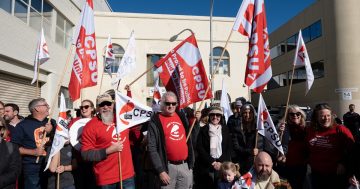
APSC chief negotiator Peter Riordan has tabled a revised pay offer. Photo: Supplied.
The Federal Government has revised its pay offer to public servants, with an increase so slight it could be knocked back by the heavily unionised Commonwealth workforce.
But the Australian Public Service Commission (APSC) believes it is on safe ground, with a genuine offer that values its employees while acknowledging the current economic climate.
During negotiations on Tuesday (29 August), the APSC tabled a salary increase offer of 11.2 per cent over three years, beginning with a 4 per cent rise next March, followed by 3.8 per cent in 2025 and another 3.4 per cent in 2026.
The Government’s previous offer was 10.5 per cent over three years – an offer flat out rejected by the Community and Public Sector Union (CPSU) after its members voted it down.
The CPSU is holding out for a 20 per cent APS-wide wage increase over three years.
The Government’s revised offer was expected to be much higher than 11.2 per cent.
But APSC chief negotiator Peter Riordan said tabling the improved pay offer, along with base salary structure and improvements to parental leave entitlements, represented the culmination of service-wide bargaining.
“The service-wide conditions represent a holistic package for APS employees. It’s a package that offers fair and equitable reward for the essential work APS employees do serving Australians,” he said.
“It recognises contemporary expectations around work and the diversity of the APS workforce, with conditions supporting equity, diversity, mobility and flexible work.
“Today I was able to offer a package of pay enhancements, flexible work arrangements and significant improvements to parental leave entitlements for both primary and secondary caregivers.
“Service-wide bargaining was an opportunity for genuine consideration of a range of conditions affecting APS employees. I considered over 1500 claims across more than 90 topics over the past five months. I thank all parties for engaging with the process.”
Industrial action could well ramp up in coming days, with the CPSU having flagged it was prepared to fight for a higher increase for public servant pay packages.
Its tone has somewhat mellowed in recent days, however, in relation to the pay rise.
Ahead of the Government’s revised offer being tabled, CPSU national secretary Melissa Donnelly said her union’s membership was looking for a package of conditions that was more than just about pay.
“We’ll take time to engage extensively with members across the APS on the detail of the package that has been negotiated, including on the pay offer, the pay equity mechanism, working conditions, and employee rights,” she said.
“The offer… needs to be about more than pay – it must be about rebuilding the APS…
“Our members want to see improvements to their pay packets so their salaries can start to catch up with the cost of living.
“But they also want to see those improvements so that workplaces aren’t riddled with ongoing vacancies and unsafe workloads.”
The revised offer promises the largest pay increase for APS employees in more than a decade, and will allow about 50 agencies to bring forward their next scheduled pay increase.
More than 50 agencies that would normally experience pay increases before 1 March 2024 will get a realignment payment to help them transition to the new pay increase date.
A revised base salary structure will help address pay fragmentation across the APS, lifting salary scales in 83 agencies, benefitting almost 8000 employees by March 2026.
Improvements to parental leave conditions will support gender equity and choice over parenting responsibilities, and primary caregivers will receive 18 weeks’ parental leave, marking an increase for 94 agencies.
Secondary caregivers will receive eight weeks’ parental leave, rising to 18 weeks over the life of the enterprise agreement. This marks an increase for all APS agencies.
In a new entitlement for the APS, there will also be paid premature birth leave from the date of birth, to what would have been 37 weeks’ gestation. Qualifying periods for paid parental leave will be removed.
The bargaining process has achieved broad support for 37 common conditions, with clauses or principles now to be drafted, for inclusion in the Statement of Common Conditions.
Those common conditions will be included in agency enterprise agreements, to be voted on as part of agreements within each agency.
Original Article published by Chris Johnson on Riotact.









